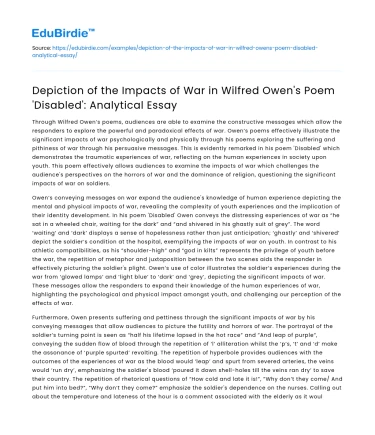Through Wilfred Owen’s poems, audiences are able to examine the constructive messages which allow the responders to explore the powerful and paradoxical effects of war. Owen’s poems effectively illustrate the significant impacts of war psychologically and physically through his poems exploring the suffering and pithiness of war through his persuasive messages. This is evidently remarked in his poem 'Disabled' which demonstrates the traumatic experiences of war, reflecting on the human experiences in society upon youth. This poem effectively allows audiences to examine the impacts of war which challenges the audience's perspectives on the horrors of war and the dominance of religion, questioning the significant impacts of war on soldiers.
Owen’s conveying messages on war expand the audience's knowledge of human experience depicting the mental and physical impacts of war, revealing the complexity of youth experiences and the implication of their identity development. In his poem 'Disabled' Owen conveys the distressing experiences of war as “he sat in a wheeled chair, waiting for the dark” and “and shivered in his ghastly suit of grey”. The word ‘waiting’ and ‘dark’ displays a sense of hopelessness rather than just anticipation; ‘ghastly’ and ‘shivered’ depict the soldier’s condition at the hospital, exemplifying the impacts of war on youth. In contrast to his athletic compatibilities, as his “shoulder-high” and “god in kilts” represents the privilege of youth before the war, the repetition of metaphor and juxtaposition between the two scenes aids the responder in effectively picturing the soldier's plight. Owen’s use of color illustrates the soldier’s experiences during the war from ‘glowed lamps’ and ’light blue’ to ‘dark’ and ‘grey’, depicting the significant impacts of war. These messages allow the responders to expand their knowledge of the human experiences of war, highlighting the psychological and physical impact amongst youth, and challenging our perception of the effects of war.
Save your time!
We can take care of your essay
- Proper editing and formatting
- Free revision, title page, and bibliography
- Flexible prices and money-back guarantee
Furthermore, Owen presents suffering and pettiness through the significant impacts of war by his conveying messages that allow audiences to picture the futility and horrors of war. The portrayal of the soldier’s turning point is seen as “half his lifetime lapsed in the hot race” and ”And leap of purple”, conveying the sudden flow of blood through the repetition of ‘l’ alliteration whilst the ‘p’s, ‘t’ and ‘d’ make the assonance of ‘purple spurted’ revolting. The repetition of hyperbole provides audiences with the outcomes of the experiences of war as the blood would ‘leap’ and spurt from severed arteries, the veins would ‘run dry’, emphasizing the soldier's blood ‘poured it down shell-holes till the veins ran dry’ to save their country. The repetition of rhetorical questions of “How cold and late it is!”, ”Why don’t they come/ And put him into bed?”, ”Why don’t they come?” emphasize the soldier's dependence on the nurses. Calling out about the temperature and lateness of the hour is a comment associated with the elderly as it would not have fit a young footballer the man once was. The repeated complaint strikes a querulous tone emphasizing the man’s helplessness like a child needs ‘putting to bed’. These persuasive messages reflect upon our human experiences in comparison to the soldier’s experiences of war amongst youth, which enhances our understanding of the suffering and pity of war.
Owen has explicitly explored the portrayal of suffering and pity of war to illuminate the effects of war through his constructive messages and images evidential in the poem, which has allowed audiences to heighten their understanding of the human experiences of war. This allows audiences to reflect and question the human experiences and paradoxical behaviors to understand the physical and psychological impacts of war amongst youth in society. Not only does Owen deepen our understanding of the harsh realities of war and its impact on soldiers, but warns about the challenges he faced during the traumatic experiences of war, effectively exploring the deprivation and horrors of war.
Did you like this example?
Make sure you submit a unique essay
Our writers will provide you with an essay sample written from scratch: any topic, any deadline, any instructions.
Cite this paper
-
APA
-
MLA
-
Harvard
-
Vancouver
War’s Impact in Wilfred Owen’s ‘Disabled’.
(2023, November 21). Edubirdie. Retrieved December 22, 2024, from https://edubirdie.com/examples/depiction-of-the-impacts-of-war-in-wilfred-owens-poem-disabled-analytical-essay/
“War’s Impact in Wilfred Owen’s ‘Disabled’.” Edubirdie, 21 Nov. 2023, edubirdie.com/examples/depiction-of-the-impacts-of-war-in-wilfred-owens-poem-disabled-analytical-essay/
War’s Impact in Wilfred Owen’s ‘Disabled’. [online].
Available at: <https://edubirdie.com/examples/depiction-of-the-impacts-of-war-in-wilfred-owens-poem-disabled-analytical-essay/> [Accessed 22 Dec. 2024].
War’s Impact in Wilfred Owen’s ‘Disabled’ [Internet]. Edubirdie.
2023 Nov 21 [cited 2024 Dec 22].
Available from: https://edubirdie.com/examples/depiction-of-the-impacts-of-war-in-wilfred-owens-poem-disabled-analytical-essay/
copy






 Stuck on your essay?
Stuck on your essay?

